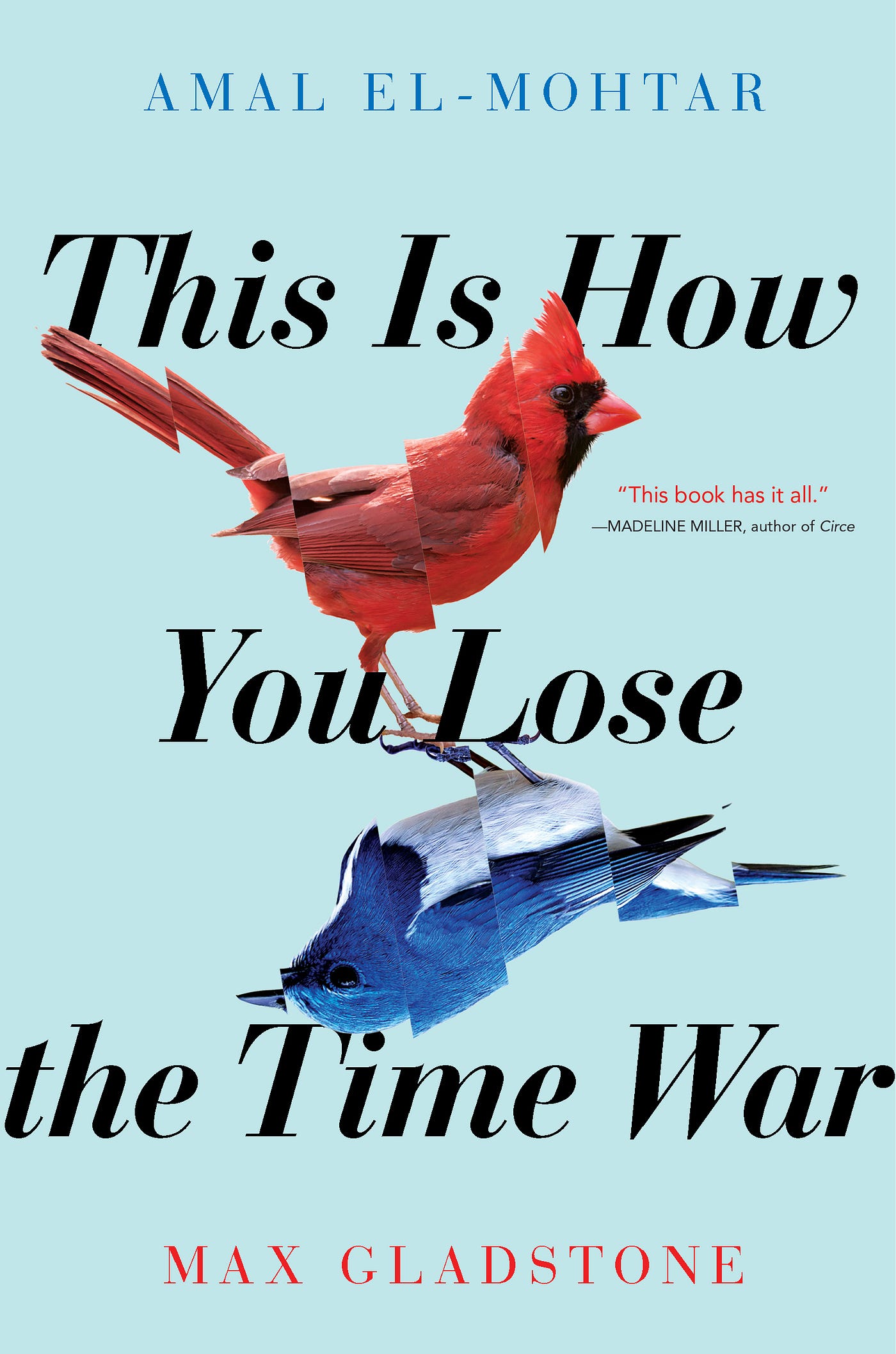This Is How You Lose the Time War Review

A Review of Amal El-Mohtar and Max Gladstone'due south "This Is How You Lose the Fourth dimension War"
Red and Bluish

This Is How You Lose the Time War is a strange and beguiling work of scientific discipline fiction, fifty-fifty by SF standards. Co-written by Amal El-Mohtar — a resident of Ottawa, Canada (where I reside) — and Max Gladstone, the novella (it runs just under 200 pages) is nigh 2 time-travelling warriors known but as Cerise and Blueish who begin exchanging letters and falling in beloved, despite the fact that they're on enemy sides. I find that a lot of science fiction is style over substance, and this book is no unlike. You have to read the cover flap to annotation that Red belongs to a post-Singularity technotopia, a indicate that is sadly lacking in the narrative itself. (You lot know that she — and yes, Red and Blue are both shes — is part of a kind of advance lodge that relies on technology, but the signal of the setting being mail service-Singularity is non mentioned.)
While this may sound like I'm knocking the novella — and perhaps I am to a degree — I have to say that I did mostly enjoy information technology. I may not have fully understood what was going on, which is something I feel when reading a fair bit of SF (over again, style over substance), but that's because the language is and so poetic and nonetheless punchy that the book becomes something of a joy to read. The style reminded me of very early Jonathan Lethem (around the time of "The Happy Man") and you lot can residuum assured that both El-Mohtar and Gladstone are highly intelligent and seem to know what they're doing to those who may be more familiar with this kind of mural than I am.
The publisher is billing this book as "Spy Vs. Spy" meets Romeo and Juliet. On the old, I don't encounter it too much as the humour — while there — is kind of muted, and as for the latter, it isn't a huge weepy everyone dies kind of tragedy. What this is nigh is 2 people (at least, I assumed they were people) reaching out to each other across a political separate, much in the way that Republicans and Democrats are then polarized today. The novel is written from the point of view of each protagonist and in the class of letters. There is no dialogue until roughly folio 130 or and then, when other characters enter the mix, and then this is largely a book about 2 people having, in many ways, the most unconventional of romances.

At that place's a fair bit of fourth dimension hopping in the book, making it sit down within the fourth dimension travel genre, equally Carmine and Blueish exchange messages they've written in dissimilar periods. These are ordinarily not conventional letters: they're sometimes written in knots in rope, bee'due south stings and the rings of tree trunks. This simply adds to the poetry of the book, and makes the work so wonderfully odd and eccentric. In fact, because the book keeps readers on their toes in all of its peculiarity, it heightens the sense of wonder and amazement in the novella itself. The downside to all of this, though, is that few things are readily explained.
For instance, the reader will never really know why a war is taking place in the beginning place — allow solitary why it is happening throughout the threads of time. I saw the Red side equally being nigh fabricated up of by machines, and the Blue side representing humanity — but it'due south not really clear if Scarlet is a car later on all, given how the book majestically ends. But maybe this lack of an caption is the whole point: there is no reason backside the state of war. It'south as though 2 sides have been battling together for an oppressively long time with no end in sight, no thing how many victories either side ratchets up. Sometimes the settings aren't really clear besides: 1 of the places Crimson winds up in is Atlantis, merely it turns out in that location are multiple Atlantises, so which one is being referred to (the mythical i or something else) isn't explained.
I besides wasn't sure what various assassinations carried out by the characters in the novel would hope to achieve. Cerise participates in the death of Julius Caesar, but, if she was governed by machines, why would they care nigh this mark? What good would Caesar'southward death do to the machine world? And why interfere in the first identify, knowing how history turned out, unless this decease takes place in a multiverse where Caesar lived? A trivial more exposition would have been helpful. To me, this is the great failing of scientific discipline fiction — it cooks upward all of these wonderful schemes, but never tries to explain away what they mean or what'south being served in the greater context.
Overall, I found This Is How You lot Lose the Time War to be a middling volume. It's nifty that information technology's so short that you can read it in a sitting or ii, merely it's likewise not so keen that it's so short at the expense of clarity. However, I have the feeling that this work will go over well with the Nebula committee, since it is so remarkably well-written and has a real cadence to language that is often missing from books in the genre. (I estimate time will merely tell. See what I did there?) So read this volume if y'all want to experience something from a pure craftsmanship point of view. But don't read this volume if you're looking for easy answers to plot elements. All in all, this is pretty par for the grade as far as SF goes, but I'm glad to know that someone from Ottawa is amongst those who are working in the genre. With a little more focus on clarity and exposition, I'm certain she'll take a groovy book in her — whether or not she writes it with someone else. I've already fallen in love with her linguistic communication.
Amal El-Mohtar and Max Gladstone'southward This Is How You Lose the Time War was published past Saga Press on July 16, 2019.
Of form, if you similar what y'all see, please recommend this piece (click on the clapping hands' icon below) and share it with your followers.
Get in affect: zacharyhoule@rogers.com
Source: https://zachary-houle.medium.com/a-review-of-amal-el-mohtar-and-max-gladstones-this-is-how-you-lose-the-time-war-6bf62761a540
0 Response to "This Is How You Lose the Time War Review"
Post a Comment